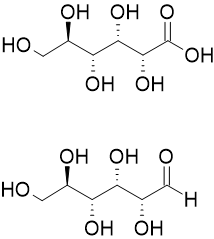Aldonic acid
Aldonic Acid
Aldonic acids are a type of sugar acid derived from the oxidation of the aldose group of a sugar molecule. They are characterized by the presence of a carboxylic acid group on the terminal carbon of the sugar chain. Aldonic acids play a significant role in various biological processes and have applications in food science, pharmaceuticals, and other industries.
Structure and Properties[edit | edit source]
Aldonic acids are typically formed by the oxidation of the primary alcohol group of an aldose sugar to a carboxylic acid group. This oxidation reaction can be enzymatically catalyzed or chemically induced. The resulting aldonic acid retains the same carbon backbone as the original aldose sugar but with an additional carboxylic acid functional group. The presence of the carboxylic acid group imparts unique properties to aldonic acids, including increased water solubility and acidity compared to their parent aldose sugars. These properties make aldonic acids useful as chelating agents, preservatives, and flavor enhancers in various applications.
Biological Significance[edit | edit source]
In biological systems, aldonic acids can be intermediates in the metabolism of sugars. Enzymatic oxidation of aldose sugars by organisms such as bacteria and fungi can lead to the production of aldonic acids as part of their metabolic pathways. These acids can serve as a source of energy or as precursors for the synthesis of other biomolecules. Aldonic acids have also been implicated in various physiological processes, including cell signaling and immune responses. Research on the role of aldonic acids in health and disease is ongoing, with potential implications for understanding metabolic disorders and developing new therapeutic strategies.
Applications[edit | edit source]
The unique properties of aldonic acids make them valuable in a range of applications. In the food industry, aldonic acids are used as natural preservatives and acidulants in beverages, dairy products, and baked goods. Their ability to chelate metal ions also makes them useful in food fortification and as antioxidants. In pharmaceuticals, aldonic acids have potential applications in drug delivery systems and as components of novel therapeutics. Their water solubility and biocompatibility make them attractive candidates for various pharmaceutical formulations. In addition to their roles in food and pharmaceuticals, aldonic acids are being explored for applications in biotechnology, materials science, and environmental remediation. Ongoing research aims to harness the unique properties of aldonic acids for diverse industrial and scientific purposes.
See Also[edit | edit source]
Navigation: Wellness - Encyclopedia - Health topics - Disease Index - Drugs - World Directory - Gray's Anatomy - Keto diet - Recipes
Search WikiMD
Ad.Tired of being Overweight? Try W8MD's physician weight loss program.
Semaglutide (Ozempic / Wegovy and Tirzepatide (Mounjaro / Zepbound) available.
Advertise on WikiMD
WikiMD is not a substitute for professional medical advice. See full disclaimer.
Credits:Most images are courtesy of Wikimedia commons, and templates Wikipedia, licensed under CC BY SA or similar.Contributors: Prab R. Tumpati, MD

